When former President Jimmy Carter describes his life he almost always mentions each of these subjects — his wife, Rosalynn, their shared Christian faith, community service and the Bible.
In his mind, these subjects are linked. Could someone please pass that information on to the political-desk editors of the Associated Press?
The bottom line: It is impossible to write about the Carters without paying some attention to the topics that mattered the most to them, as opposed to the subjects that matter the most to political-desk journalists. If you know lots of people who have followed the Carters for decades (I even have a nephew named “Carter”), you know the role that their evolving, progressive Baptist convictions played in their story.
The death of Rosalynn Carter this weekend gives news consumers a first draft of the coverage that will follow the looming death of the 99-year-old former president, who remains in hospice care.
Much of the Carter coverage today is starkly secular and faith-free. How is that possible?
But let’s start with a positive note, care of a nuanced passage in the New York Times obit that offers an outline of what journalists will find if they explore Carter territory with open eyes and even the slightest interest in the faith elements therein. Read the following carefully
Reared in the same tiny patch of Georgia farmland, 150 miles south of Atlanta, they were similar in temperament and outlook. They shared a fierce work ethic, a drive for self-improvement and an earnest, even pious, demeanor. Their Christian faith was central to their lives. Both were frugal. Both could be stubborn.
After Mr. Carter lost his re-election bid in 1980 to Ronald Reagan, he and Mrs. Carter embarked on what became the longest, most active post-presidency in American history. They traveled the world in support of human rights, democracy and health programs; domestically, they labored in service to others, most prominently pounding nails to help build houses for Habitat for Humanity.










